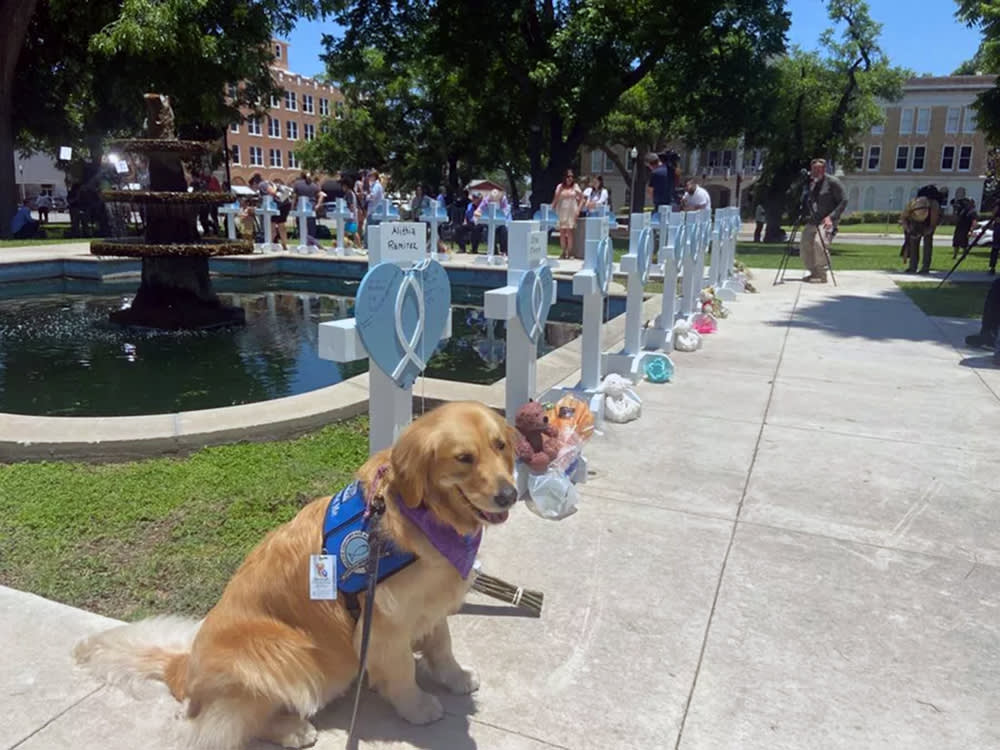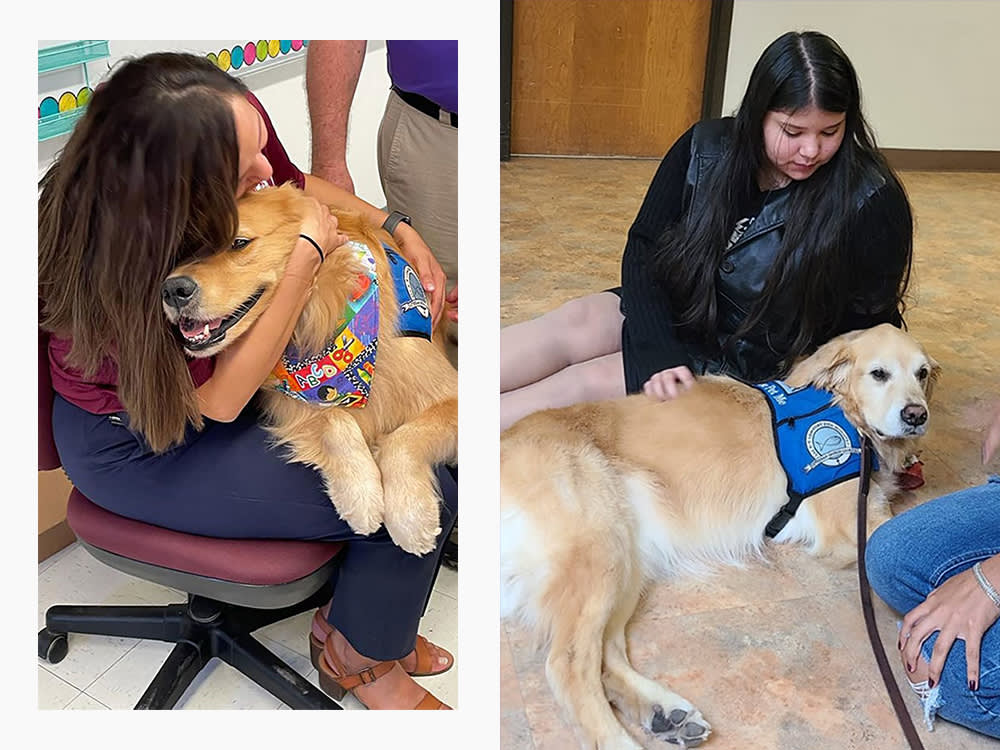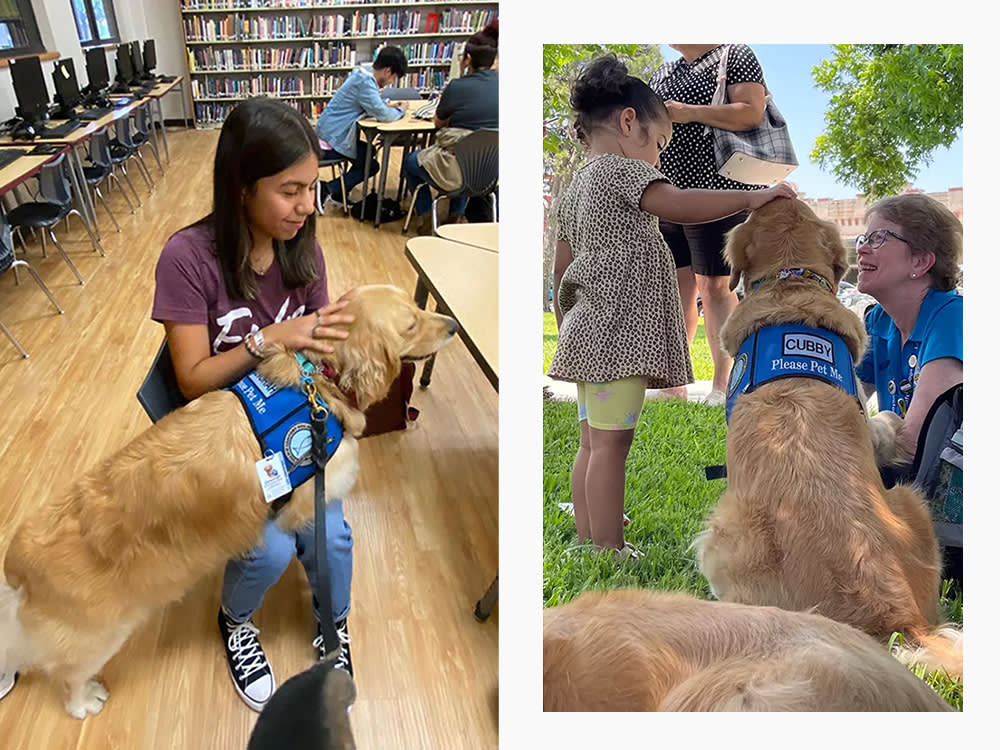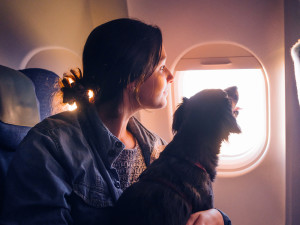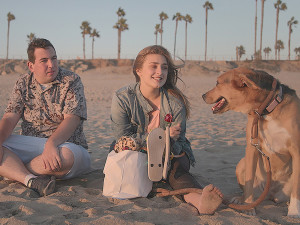Uvalde Students Have Some New Pals Going Back to School With Them: Dogs
How Golden Retrievers are helping Uvalde, TX, students return to class after the May 2022 tragedy.
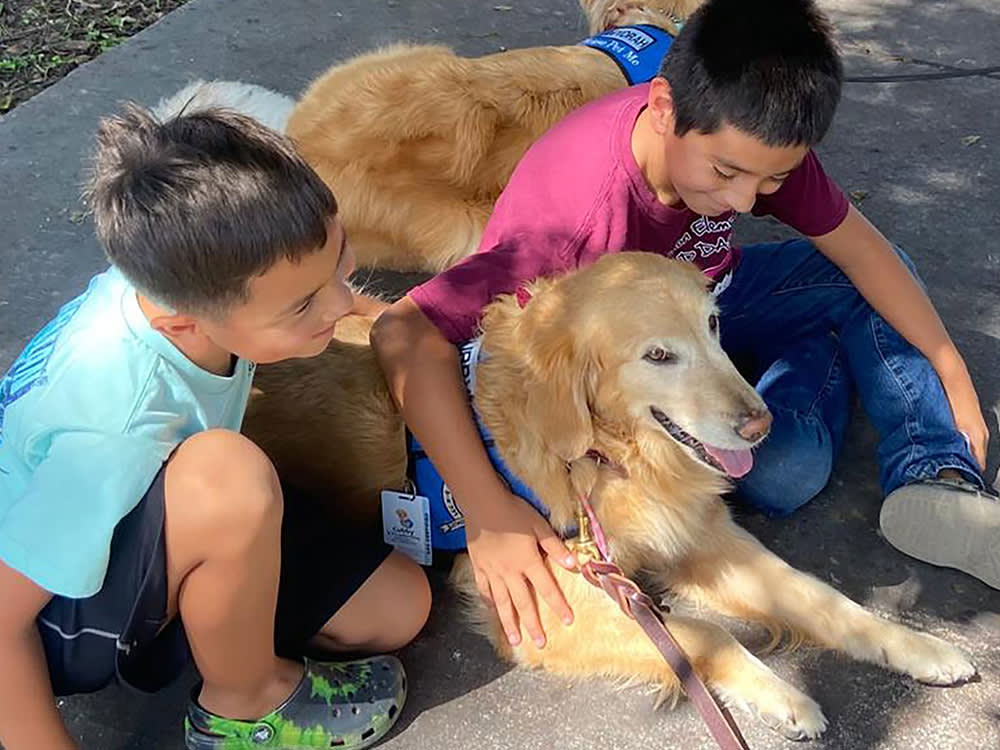
Share Article
On May 24, 2022, a gunman entered Robb Elementary School in Uvalde, Texas and murdered 19 children and two teachers, injuring 17opens in new tab others. It was the deadliest U.S. school shootingopens in new tab since Sandy Hook Elementary nearly 10 years ago. The massacre at Robb devastated the heavily Christian, largely Latino small town. Then, after Labor Day, the people of Uvalde had to do the unthinkable: send their kids back to school.
Bonnie Fear, Lutheran Church Charitiesopens in new tab (LCC) K-9 Crisis Response Coordinator, traveled to the town with a small fleet of dog just after the shooting, to comfort the community. The organization stations dogs and their handlers across eight schools, from kindergarten to 12th grade — not including Robb Elementary, which will be demolished and rebuiltopens in new tab.
“Last week, the school district invited them back to ease children back into classrooms. I think the kids are relieved when they see the dogs,” Fear says. “One student would not get out of the car. We asked if they wanted a dog. That dog took that person from the car, all the way in to get registered at the counselor’s office, to a class.”
The Canine Effect
Dr. Thomas Demaria, PhD, a consultant for the National Center for School crisis and Bereavement, has also witnessed the positive impact of animals (dogs, horses, even pigs) on survivors. “It’s an amazing transformation of children sometimes,” he explains. “What’s scary is the violence is perpetrated by a human person. Animals — especially dogs — have the capacity to approach children in a safe, comforting way, where they don’t feel alone anymore.”
Twenty-one years ago, Demaria, a clinical and school psychologist, worked with children impacted by 9/11. He recalls that, just after the attack, many grieving students would hide under desks. “The only way we could get them out is if one of the therapy dogs went under the table,” he says. “The child would pet the dog for 20 minutes, and the dog would just sit there patiently.”

He adds that when the kids were ready, they’d come out and talk: “Dogs provided that vehicle to connect again with their feelings, to feel safe. It’s a magical effect. I saw the same thing in Parkland.”
Essential Responders
Fear and her team were in Parkland, Florida, where a gunman murdered opens in new tab 17 people at Marjory Stoneman Douglas High School in February 2018. They were also at Sandy Hook, where 26 people were killed. In fact, if you name any major crisis or disaster, they were probably there, because the presence of comfort dogs has become an accepted step in the healing process.
“Research has supported the fact that, even for adults, animals help reduce blood pressure,” Demaria says. “It can be viewed as a valuable adjunct to a lot of the work. I don't think it will take the place of having counselors available. But not every kid needs counseling. And sometimes kids just need that security, that nurture and support that an animal seems to consistently provide.”
The LCC helps mourners find them by putting up the type of crosses and hearts often seen near memorials, so they can introduce the comfort canines to the mourners. “When we put those up, we know that people are going to come,” Fear says. “At Uvalde, we put up 21 crosses and hearts a day or two later after shooting, and that's where we had the dogs.”
Keeping Everyone Calm
In public-school classrooms, however, there are logistics: allergies, kids are afraid of dogs, religious boundaries. Though affiliated with a network of churches, the organization — which operates on donations — does not proselytize.
They use Golden Retrievers, who let people come to them, to allay any safety concerns. “They melt into people. They’re very calm. They’re professionally trained for 2,000 hours. They don’t bark. They don't jump around. They don’t get treats. They’re not pets. They are working dogs.” The school district notifies the parents, and the LCC K-9s come with accreditations, vaccination records, as well as background checks for the handlers.
There is, of course, such a thing as too much dog. Demaria suggests establishing animal-free zones for those who are scared of dogs. He also suggests treating their presence as a transitory strategy.
“You want to make it so that the animals are not the focus of what kids go to school for,” he explains. “Because schools are places of learning, and also for social and emotional development. Initially, the dogs are there to provide that confidence, safety, distraction. Then, over time, you want the dogs to be less available, so the school can begin to focus more on teaching.”
Old Friends
For the Uvalde school district, the LCC, which has 130 dogs across 27 states, has deployed roughly 10 dogs per week for three weeks. They introduce the dogs in waves; the animals, who get nightly massages to de-stress, grow tired after four to five days on the job. (“Most of the humans are expended as well,” she notes.) To build familiarity, they also make sure the same dogs attend the school each week.
“Some kids who remember the dogs [from the memorial, a few months back] are starting to talk to the dogs,” Fear says. The kids are laying beside the dogs. They’re hugging them. They’re kissing them. “We’ve had kids who were distraught or teary-eyed in the morning, and by the time the dogs left, they have smiles on their faces,” she says. “And that is in one day.”

Nisha Gopalan
Nisha Gopalan has been a writer/editor for The New York Times, New York magazine, Entertainment Weekly, Variety, The Hollywood Reporter, and NYLON magazines. She currently resides in Los Angeles.
Related articles
![Backlit photo of a woman seated on an airplane holding her dog in her lap while they both look out of the open window.]()
You Can’t Fly With Your Your ESA, But Your PSD Is Welcome on a Plane
Find out how here, including what the heck those acronyms mean.
On the Autism Spectrum? Get a Dog
Dr. Annie Bowes, a veterinarian on the spectrum, explains: “Dogs sense the world like we do, and don’t judge us.”
![A service dog for PTSD walking outside looking up at the camera]()
Service Dogs Can Ease Veterans’ PTSD and Anxiety, Studies Say
![Valentin Pujadas illustration]()
FYI, Pets Are Incredibly Good For Your Mental Health
Experts share the science-backed ways our pets offer us emotional support.
